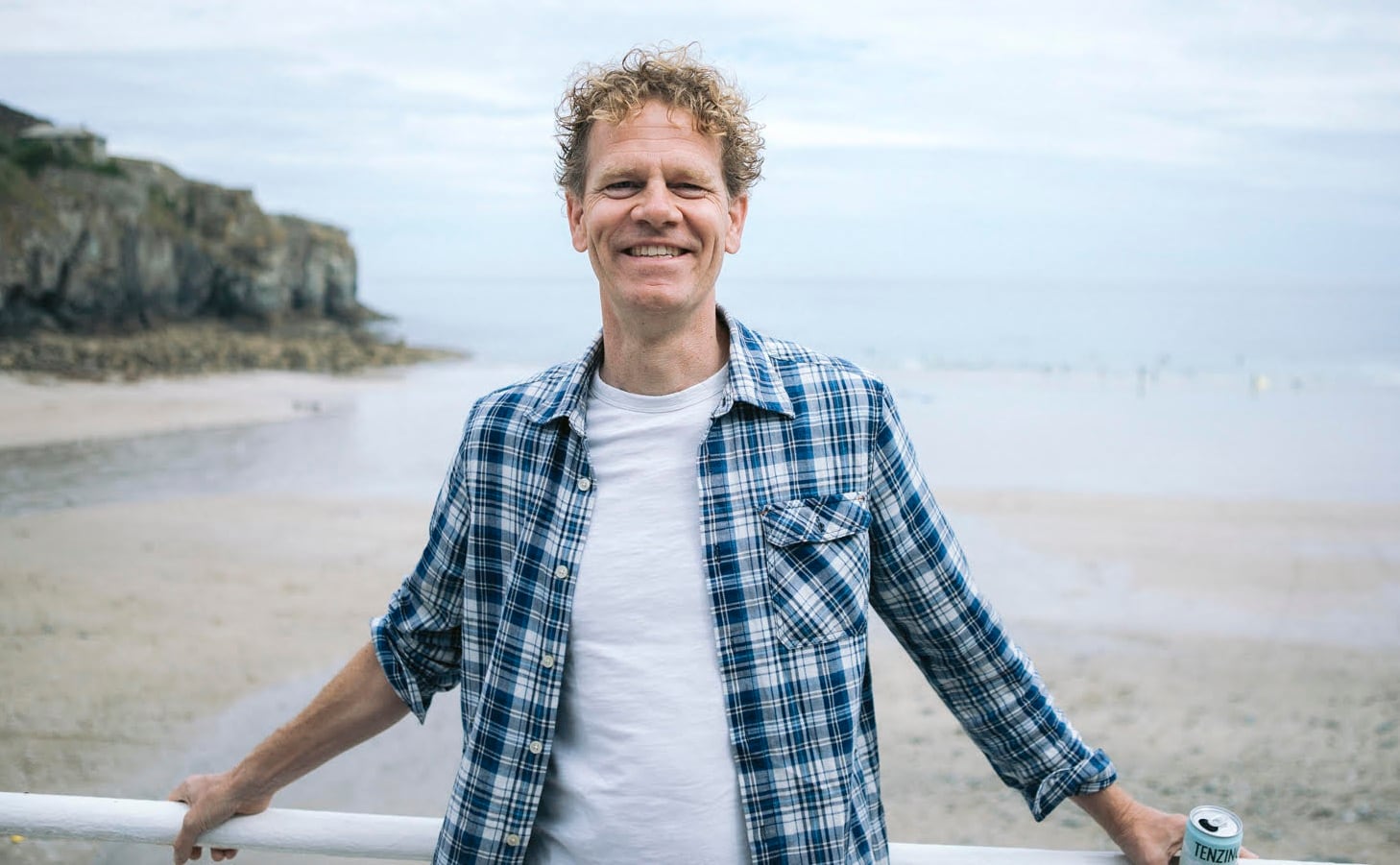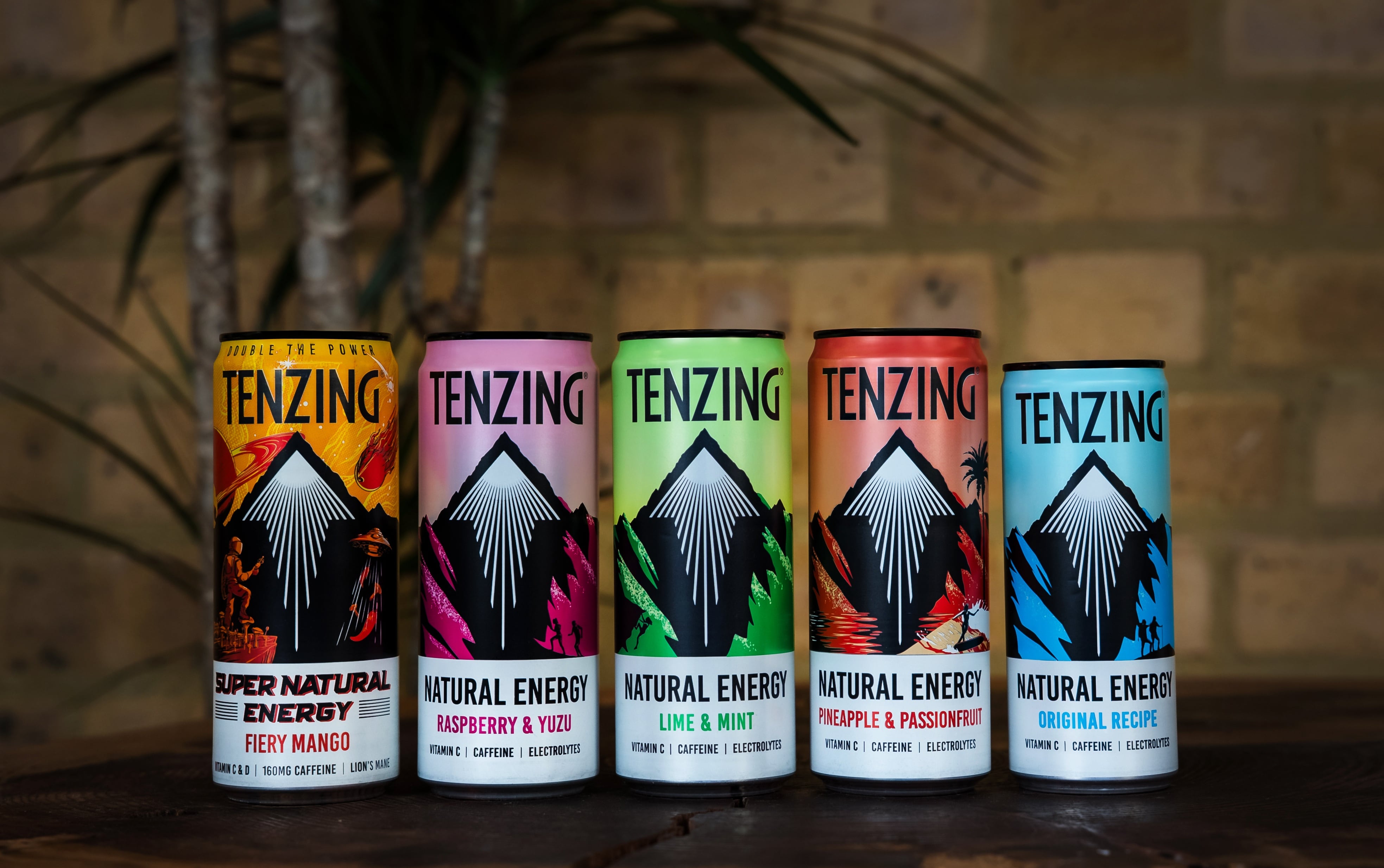Founder Huib van Bockel spent eight years as UK and European marketing director for Red Bull: before deciding to dedicate himself to natural energy drink brand Tenzing, which launched in 2016.
Today, Tenzing is the UK’s top natural energy drink brand, sold in every major retailer.
The energy drink category is worth £2.2bn in the UK, growing 5% year-on-year, and Tenzing has quickly become the fourth largest functional energy drink in UK grocery.
In 2022, it won Tesco’s Soft Drink Supplier of the Year award; and it’s the supermarket’s #3 functional energy drink. And it’s also a proud B Corp business.
2025 has been a big year for Tenzing: with the brand announcing investment from Heineken in April, which will serve as a springboard for expansion in the convenience channel.
Huib van Bockel tells us how he’s built the brand; attracted investment; and what he’s learned along the way...
BD: Introduce us to Tenzing!
HVB: Energy, somehow - just because of a couple of brands - has come into our psyche as this artificial, high sugar drink. Fossil-fueled cars, Formula 1, Monster trucks, etc.
But at the end of the day, to get energy, you don’t need artificial ingredients or high sugar levels.
So I thought: it should be very possible to create a drink that is 100% from nature, that doesn’t have high sugar, and that also cares about nature in return. That was the basic concept.
When I left Red Bull, I was travelling with my family. And I saw what the sherpas drink in Nepal when they’re scaling the world’s highest mountains. And they drink two teas: a really strong tea with salt and a lemon tea. I asked a doctor about the science behind this and he said yes, there’s a triple hit of natural caffeine, antioxidants and essential electrolytes.
And that became the basis of our recipe.

Take us through what ‘natural energy’ means for Tenzing
Tenzing is 100% from nature, low calorie, no junk. Like I said before: natural caffeine, antioxidants, essential electrolytes.
But here’s what’s really cool: we’ve done a lot of research with our heavy users as to why they try the drink and why they stay - and these reasons are different.
People usually do come into the brand because they’re looking for a better-for-you option: they’re enticed by the natural energy or the low calories. But then they stay actually for the effect.
So 91% of our audience that are heavy users say they get the same or more energy than an artificial energy drink, without the crash, and that part has become an incresingly important element. That’s because we’ve got 60% less sugar: so you don’t get the sugar high then crash. And secondly, because artificial caffeine gives you a more harsh spike, whereas we have natural caffeine from green coffee and green tea.
Now it’s always interesting because nutritional science is very difficult. But it’s really cool to see that this actually works. If you look on Amazon, we get so many people saying I love it because of the taste and because it’s refreshing.
So people come for health; and they stay for the effect and the taste.
Choosing a name for a beverage brand
New Zealander Edmund Hillary and Sherpa Tenzing Norgay were the first to summit Mount Everest in 1953. Huib met the Tenzing family, descendants of Tenzing Norgay: and was inspired by stories of Sherpa Tenzing's closeness to nature, his drive for adventure and burning ambition to climb Mount Everest.
The recipe for Tenzing is inspired by traditional Himalayan teas, which Sherpas use to fuel their high-altitude expeditions. And 'zing' also means energy.
Who is your target market?
That’s an interesting question, because I’ve always hated words like ‘target’ and ‘consumer’.
We’ve always had a big community approach. I’ve always believed in communities and that was the beauty of starting my own business: you can try and do what you believe in. So it’s what we can do for communities that really fit our brand.
The first community we looked at was bouldering and climbing. There’s a big bouldering community that has grown massively - it’s one of the fastest growing sports in the UK, there’s over 200 bouldering walls in the UK. So that’s our first audience: they’re adventure-seeking, they’ve already moved on from artificial energy drinks.
Then we started looking at runners. And the beauty of runners is it could be an 18-year-old runner at a university club or a 55-year-old runner.
We’ve been sponsoring big run events for years: the Royal Parks Half Marathon or the Hackney Half. And we like to run ourselves, climb ourselves. And then we’re very involved in these communities ourselves: and we say what can we do for these communities that actually matters to them? So, for example, we launched the Clean Air Tracker in London: we worked with Imperial College to find the cleanest air you could run in.
So I think this is a more powerful way to target an audience, than targeting a set age group or demographic.
We’re also big in universities, big tech offices like Google, and the gym space.
Tenzing will celebrate its 10th birthday next year. Tell us about your growth trajectory to date.
I thought growth would be faster at the beginning than it was. Everyone knew that energy drinks have lots of sugar, calories and artificial ingredients and taurine. So I thought: if I launch a drink that takes away those worries, people will just shift.
But something I underestimated is you need two big things: habit and availability. That stopped the shift from happening so quickly.
Literally the first thing I did, when I decided to do this, was Google ‘Mistakes people make when starting their own business’
Huib van Bockel
We started in 2016, bootstrapped for two years, got our first big funding round in 2018. But then we were hard-hit by COVID. As I said, we’d built up in gyms, bouldering walls, offices and universities... and they all closed. We still managed to grow in those years: but if COVID had happened a couple of years earlier, I don’t think we would have made it.
Then growth has gone up again. We’ve just landed our new investment deal, and we’ve got great momentum again. We’ve never not grown over the years, but we’ve had periods where it’s been faster than others.
And now, we’re finally seeing the shift I expected happening. We’ve got some amazing stats: we’re #3 in the UK and we’ve passed some of these big brands that have been around for decades.
So I think the message is that growing a brand is not going to go as fast as you think in the beginning.
You attracted investment from Heineken earlier this year. Why are they the right fit? A lot of people must be wondering how a beer company can help you...
We’re already big in grocery, #4 in the UK, #3 in London. But the UK landscape for drinks includes the big convenience sector, around 40,000 convenience stores, and as a small business there’s no way to go round to all of these and get into those.
And the beauty is that Heineken does that. And Heineken only covers a couple of occasions - mainly night time and social - but they are addressing the same decision-maker. So they’re going to help us with the convenience push and that’s a huge added value that a big company can do way bigger than us.
Of course, from their perspective, the lines are becoming a lot more blurred now with low and no alcohol. You have Heineken 0.0, and the lines are blurring more with soft drinks. And energy drinks is a huge market, it’s a fast growing segment.
Seven deadly things: Huib van Bockel
What’s your poison? Tenzing Peach & Honey Melon. Our brand-new flavour this month: and genuinely the first thing I think about when I wake up. I’ve never been more excited about a launch.
What’s your worst vice? Overthinking. I’m creative, always buzzing with new ideas… but the challenge is sticking to one.
Worst work mistake? Taking non-hierarchy too far and letting people set their own salaries . It hurt me that it didn’t work... but it was naïve to think it would.
Biggest waste of money? Launching a new country too soon. We made 150,000 cans for Spain, hardly sold any, and ended up sampling them away back in the UK. Costly, humbling, and unforgettable.
A brand you’re jealous of? Oatly . Not because of the product, but for their clarity. They picked a fight, stood their ground, and built a movement around it.
When has your pride caused a fall? I’ve probably got too little pride, which is why there’ve been plenty of falls. But each one taught me something and made Tenzing stronger.
What makes you most angry? Brands claiming to be “natural” because they throw in one token ingredient, then pump the rest full of artificial vitamins and chemicals. That’s not natural energy: it’s greenwashing.
What’s your top tip to other beverage entrepreneurs?
You have to be really sure you’re a very resilient person and that you have a network around you that will be there when you’re down. Because there’s no sugar-coating it: it’s genuinely tough.
When you read about other beverage entrepreneurs - I remember reading Richard Branson’s Losing my Virginity; Nike’s Shoe Dog - you always read these in a romantic light. ‘You ran out of money, then you got money, it’s so cool’. You don’t really think about how it actually feels when you don’t have any money and this brand is your baby.
And find a job that you really believe in. It’s not about the exit: it’s about loving what you do. That’s why I’ve told you about the community side, because I love that bit, going to bouldering walls, organizing events there.
And always find your focus area. Any business that has ever been successful did that. Even the fastest scaling business - like Facebook, that started just on Harvard. Then Stanford. Then university students.
I saw the founder of Deliveroo speak once, and he did just one postcode for a year. Strava is a great example: they could have done every sport from day one, but they decided to just do cycling. They wanted to make it really rich for that one community.
You will have limited resources: so you have to try and make it successful in one area, and if that works super fast, then you can scale super fast. But I don’t think any business ever made it without having a clear focus strategy first.

